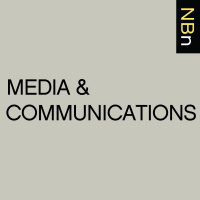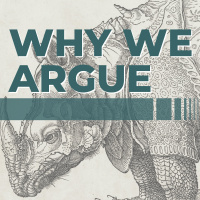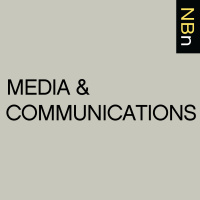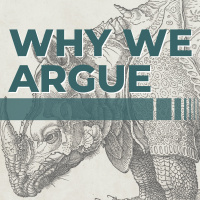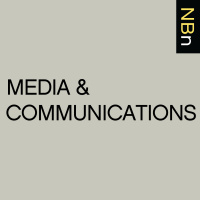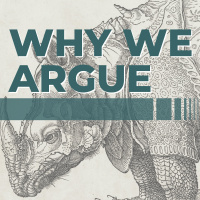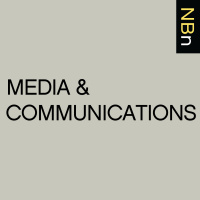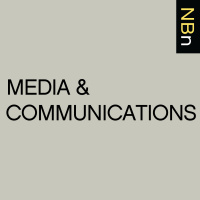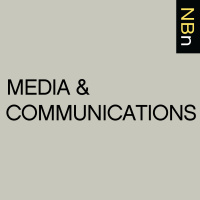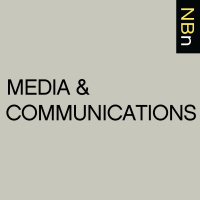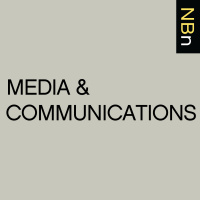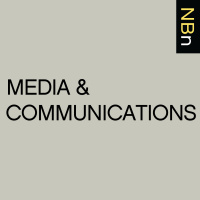Synopsis
Interviews with Scholars of Media and Communications about their New Books
Episodes
-
Mark Banks, “Creative Justice: Cultural Industries, Work and Inequality” (Rowman and Littlefield, 2017)
20/06/2017 Duration: 49minHow can we address inequity and injustice in cultural and creative industries? In Creative Justice: Cultural Industries, Work and Inequality (Rowman and Littlefield, 2017), Mark Banks, a professor of culture and communication and director of CAMEo, the research institute for Cultural and Media Economies, at the University of Leicester, sets out a new approach to cultural and creative industries, focused on creative justice. Creative justice develops through the seven chapters of the book, which engage with a range of interdisciplinary concerns about cultural and creative work. The book restates the importance of cultural objects (which are often marginalised in sociological analysis) before moving to consider how justice might be done to the practices of creative work and the workers themselves. Later parts of the analysis think through questions of access, both historical and contemporary, to the cultural sector, with a new set of concepts for creative justice forming the conclusion of the book. It will be e
-
Gillian McIver, “Art History for Filmmakers: The Art of Visual Storytelling” (Bloomsbury, 2016)
14/06/2017 Duration: 48minGillian McIver‘s Art History for Filmmakers: The Art of Visual Storytelling (Bloomsbury, 2016) is a ground-breaking book that illustrates the relationships among the histories of painting and cinema. Of interest to established filmmakers, students of film, and those engaged with the history of art and visual storytelling overall, Art History for Filmmakers is a comprehensive study of the ways in which painting and film influence one another in terms of light, composition, subject matter, theme and style. McIver presents examples of the impact of painting from the antique to the modern upon the work of filmmakers Peter Greenaway, Martin Scorcese, Peter Webber, Stan Douglas, Guillermo de Toro, John Ford and others. Through an array of color images, McIver demonstrates how Dutch Baroque, Realism, Surrealism, Expressionism, Minimalism and other art historical movements shape story and appearance in film. Art History for Filmmakers also provokes consideration of the ways the language of film brings idea and form t
-
Clyde Farnsworth, “Tangled Bylines: A Father and Son Cover the Twentieth Century” (U. Missouri Press, 2017)
31/05/2017 Duration: 43minJournalists intentionally leave themselves out of the stories they cover. In Clyde H. Farnsworth‘s book Tangled Bylines: A Father and Son Cover the Twentieth Century (University of Missouri Press, 2017) he gets the chance to tell not only his own stories, but also those of his journalist father. Farnsworth spent most of his career as a foreign correspondent and both he and his father worked at the same time at the New York Times. In the book he shares what it was like to cover historical events and grow up in the shadow of his father’s career. The book features stories about unique encounters with notable people, such as Amelia Earhart and Winston Churchill as well as personal vignettes of a real-life family in the twentieth century. Tangled Bylines provides unique perspectives on the transformations and consistencies in journalism from the 1920s through to the digital age. It provides a foundation for understanding a specific, sometimes singular facet of the history of American journalism. Learn more about
-
James Poyner, “Trump Tweets: His Social Media Phenomenon” (Wilkinson Publishing, 2017)
18/05/2017 Duration: 01h19minThe title of James Poyner’s book, Trump Tweets: His Social Media Phenomenon (Wilkinson Publishing, 2017), tells you everything you need to know about the world you about to enter. In temperament, and style, Trump was unlike any presidential candidate who came before him. The media and the public were enthralled with his antics. However, what stood out for many was Trumps thoroughly unique communication style. This book gives an in-depth look at how Trump used Twitter to attack, criticise, publicise and expand the reach of brand Trump. Poyner uses several key events to move the book forward and tell the story of how Trump used Twitter, from the start of his presidential campaign right up until Inauguration day. Exploring not only Trumps tweets but the publics reaction to them, Poyner is able to capture unique moments in history and examine how they impacted the race to the White House. The term Twitter-storm was coined long before Trump threw his hat into the presidential race but no other figure, since the
-
Different Medias with Eric Alterman
18/05/2017 Duration: 29minHow can we as consumers distinguish between the many different political medias? Eric Alterman is CUNY Distinguished Professor of English and Journalism at Brooklyn College. Eric is also a columnist for The Nation, and a senior fellow at the Center for American Progress in Washington and the World Policy Institute in New York. He is the author of several books, including When Presidents Lie (Penguin 2004), Kabuki Democracy (Nation Books 2011), and most recently, Inequality and One City (Nation Books 2015). The "Why We Argue" podcast is produced by the Humanities Institute at the University of Connecticut as part of the Humility and Conviction in Public Life project. Learn more about your ad choices. Visit megaphone.fm/adchoices Support our show by becoming a premium member! https://newbooksnetwork.supportingcast.fm/communications
-
Matt Pearl, “The Solo Video Journalist: Doing It All and Doing it Well in TV Multimedia Journalism” (Focal Press, 2016)
04/05/2017 Duration: 01h46sWhile the title of Matt Pearl‘s book, The Solo Video Journalist: Doing it All and Doing It Well in TV Multimedia Journalism (Focal Press, 2016), hints at a solitary existence, he shares experiences of many journalists who have inspired his work and emphasizes the community built around multimedia journalism. He has worked in television news for more than a decade and shares what he’s learned in a clear and logical way while still telling a story. The book gives a hands-on approach that walks the reader through planning a segment, dressing the part, conducting interviews and editing the content. For quite a long period of time, those in news media were part of a stable industry that hadn’t seen much change. The past few decades have been the opposite of stable. The expectations of those in journalistic roles are more fluid today. The definition of a multimedia journalist is a moving target of sorts, and Pearl has experienced adapting to those shifts and changes in the field. The book not only provides useful i
-
Jeremy C. Young, “The Age of Charisma: Leaders, Follwoers, and Emotions in American Society, 1870-1940” (Cambridge UP, 2017)
04/05/2017 Duration: 51minIn the age of the railroad, social movements, revivals, and campaigns for political office spread like wildfire across the United States. Leaders and their surrogates could go travel faster than ever before, even as industrial capitalism overthrew the public and private relationships of a previous era. As would-be movement leaders discovered their growing power to reach a national audience, their experience speaking to gathered crowds in city after city and town after town produced a new style of public address. Jeremy C. Young‘s The Age of Charisma: Leaders, Followers, and Emotions in American Society, 1870-1940 (Cambridge University Press 2017), traces the history of that new style from the theoretical foundation laid down by its forbears in the 1840s, through the battles over charisma’s power at the height in the early 1900s, to its eventual decline as a new technology, radio, again flipped the script on what it meant to address a national audience. The Age of Charisma is a fascinating history of a period
-
Kathleen Collins, “Dr. Joyce Brothers: The Founding Mother of TV Psychology” (Rowman and Littlefield, 2016)
22/04/2017 Duration: 53minIn her book, Dr. Joyce Brothers: The Founding Mother of TV Psychology (Rowman and Littlefield, 2016), Kathleen Collins presents an extensive history of the woman who is arguably the most famous television psychologist. Starting with Brothers’ appearance as a boxing expert on the $64,000 Question in the 1950s, and bringing readers through her decades-long career in television and radio, Collins argues that Brothers created the personal approach to psychology that became the norm for television other popular media. Collins examines the different ways that Brothers created a career for herself for over 50 years, looking at her role as psychologist, as well as her roles as guest star, actor, and media celebrity. She looks at the ways Brothers used her savvy business sense to create a multilayered career that made vital contributions to psychology, television, and U.S. cultural history. Collins uses Brothers’ personal papers and her published interviews as well as her own interviews with Brothers’ daughter and col
-
Democracy and Dialogue Online with Joshua Cohen
20/04/2017 Duration: 36minJoshua Cohen is a faculty member of Apple University, and is Distinguished Senior Fellow at the School of Law, the Department of Philosophy, and the Department of Political Science at Berkeley. He is the author of several influential academic articles, many of which are collected in Philosophy, Politics, Democracy(Harvard 2009), and The Arc of the Moral Universe and Other Essays (Harvard, 2011). Since 1991, Cohen has edited the Boston Review. The "Why We Argue" podcast is produced by the Humanities Institute at the University of Connecticut as part of the Humility and Conviction in Public Life project. Learn more about your ad choices. Visit megaphone.fm/adchoices Support our show by becoming a premium member! https://newbooksnetwork.supportingcast.fm/communications
-
Donna Freitas, “The Happiness Effect: How Social Media is Driving a Generation to Appear Perfect at Any Cost” (Oxford UP, 2017)
18/04/2017 Duration: 24minIn The Happiness Effect: How Social Media is Driving a Generation to Appear Perfect at Any Cost (Oxford University Press, 2017), Donna Freitas investigates the darker side of social media use and explains how pressure to appear happy and successful online can actually make people less happy in the real world. Using the stories of college students she interviewed as a framework, Freitas builds a dynamic argument and offers concrete tools for how teachers, parents, and society as a whole can help young people take control of their smartphones and of their own happiness. Donna Freitas is a Nonresident Research Associate at the University of Notre Dames Center for the Study of Religion and Society, and when she is not traveling for research she teaches in the Honors Colleges at Hofstra University. She is the author of Sex and the Soul: Juggling Sexuality, Spirituality, Romance, and Religion on America’s College Campuses (Oxford University Press, 2008), as well as several novels for young adults. A regular contrib
-
Rebecca Scales, “Radio and the Politics of Sound in Interwar France, 1921-1939” (Cambridge UP, 2016)
13/04/2017 Duration: 01h49sWhat did sound mean to French people as radio and other listening technologies began to proliferate in the early twentieth century? What was the nature and significance of French auditory culture in the years between the two world wars? These are two of the central questions that Rebecca Scales pursues in her new book, Radio and the Politics of Sound in Interwar France, 1921-1939 (Cambridge University Press, 2016). This is not a book focused on the institutional history or content of French radio during this period, however. Rather, Scales examines closely a range of ideas about sound and the development of what she calls the “radio nation,” a space of listening, cultural identity, and citizenship. Access to the airwaves, the “right to listen,” and the question of whether radio did or did not reflect the nation and its different members became vital areas of discussion and debate in the 1920 and 30s. Radio and the Politics…explores the dynamic history of radio at a critical juncture in modern French politica
-
Democracy and Social Media with Michael Lynch
05/04/2017 Duration: 26minSocial Media rewards snap judgments and blind conviction. Michael Lynch finds this troubling. Michael P. Lynch is Professor of Philosophy and Director of the Humanities Institute a University of Connecticut. His research concerns truth, public discourse, and the impact of technology on democratic society. The "Why We Argue" podcast is produced by the Humanities Institute at the University of Connecticut as part of the Humility and Conviction in Public Life project. Learn more about your ad choices. Visit megaphone.fm/adchoices Support our show by becoming a premium member! https://newbooksnetwork.supportingcast.fm/communications
-
Free Speech Matters with Robert George
05/04/2017 Duration: 31minThe ‘ideological odd couple’ of Robert George and Cornel West jointly authored a statement defending free speech on campus and elsewhere. Find out why. Robert George is the McCormick Professor of Jurisprudence and Professor of Politics at Princeton University, and the founding director of Princeton’s James Madison Program in American Ideals and Institutions. His research focuses on issues in ethics, political philosophy, and philosophy of law. The "Why We Argue" podcast is produced by the Humanities Institute at the University of Connecticut as part of the Humility and Conviction in Public Life project. Learn more about your ad choices. Visit megaphone.fm/adchoices Support our show by becoming a premium member! https://newbooksnetwork.supportingcast.fm/communications
-
Steven M. Avella, “Charles K. McClatchy and the Golden Era of American Journalism” (U. Missouri Press, 2016)
04/04/2017 Duration: 54minCharles K. (CK) McClatchy was a towering figure in the making of Sacramento and the inland empire he liked to call Superior California. As editor of the Sacramento Bee from 1883 to 1936, McClatchy was both ardent booster and strident critic, a man whose voice helped shape Sacramento’s industrial landscape and to set its moral and political tone. In a new biography, Charles McClatchy and the Golden Era of American Journalism (University of Missouri Press, 2016), Steven M. Avella explores McClatchy’s public role as an iconoclastic editor who sketched local battles in dramatic terms of good and evil. Avella also examines the contradictions within the private man and the dark impulses that drove him to bouts of vindictiveness and rancor. McClatchy promoted his beloved Sacramento with a distinctive blend of Progressive politics, but in his later years he suffered from an anachronistic world view that relegated him to the sidelines of American life. This biography, based on extensive primary sources, is a fully dra
-
Steve Aldous, “The World of Shaft: A Complete Guide to the Novels, Comic Strip, Films and Television Series” (McFarland, 2015)
29/03/2017 Duration: 44minWho’s the black private dick That’s a sex machine to all the chicks? (Shaft) Ya damn right Who is the man that would risk his neck For his brother man? (Shaft) Can you dig it? Who’s the cat that won’t cop out When there’s danger all about? (Shaft) Right on They say this cat Shaft is a bad mother – (Shut your mouth) But I’m talkin’ ’bout Shaft – (Then we can dig it) He’s a complicated man But no one understands him but his woman (John Shaft) –Theme from Shaft by Isaac Hayes Mention Shaft and most people think of Gordon Park’s seminal 1971 film starring Richard Roundtree in a leather coat, walking the streets of Manhattan to Isaac Hayes’ iconic theme music. But the black private dick that inspired the black action cinema/blaxploitation film genre actually made his debut on the printed page as the creation of white novelist Ernest Tidyman, who was a seasoned journalist down on his luck when he decided to try his hand at fiction. Shaft was the result, giving Tidyman the break he was looking for. T
-
Kate Murphy, “Behind the Wireless: A History of Early Women at the BBC” (Palgrave Macmillan, 2016)
22/03/2017 Duration: 49minFrom the early days of the BBC in 1922, women were everywhere in the broadcasting company’s offices. They were absent, however, argues Dr. Kate Murphy from most of the historiography devoted to this illustrious institution. In this vibrant monograph, Murphy sets out to find these hidden female figures. A former producer of the long-running program Woman’s Hour and currently a Senior Lecturer at Bournemouth University in the UK, Murphy is cognizant both of women’s contribution to the BBC and of the challenges they face working there. In Behind the Wireless: A History of Women at the BBC (Palgrave Macmillan, 2016), Murphy delivers on the titles promises. First, she offers a detailed portrait of the BBC in the interwar period as a unique workplace complete with medical services, a subsidized canteen, and a country-club for its workers. She demonstrates why the fact that the company was created around on a new technology made it especially suitable for women in general, and ambitious ones in particular. Second, s
-
James McGrath Morris, “Eye on the Struggle: Ethel Payne, the First Lady of the Black Press” (Amistad, Reprint Edition, 2017)
22/03/2017 Duration: 01h59sIn his acclaimed biography Eye on the Struggle: Ethel Payne, the First Lady of the Black Press (Amistad, Reprint Edition, 2017), James McGrath Morris explores the fascinating life of pioneering black female journalist Ethel Payne. Backed by exhaustive archival research, Morris traces Payne’s role in documenting the civil rights struggle during the decades following World War II, before her later impact as the first female African American radio and television commentator on a national network. The New York Times has described Eyes on the Struggle as an “an important and often absorbing new book,” while the Chicago Tribune has contended that Morris’ beautifully written and carefully researched new book “gives Payne’s ground-breaking work the attention it deserves.” Morris’ other books include Pulitzer: A Life in Politics, Print, and Power, which Booklist placed on its 2010 list of the ten best biographies, and The Rose Man of Sing Sing: A True Tale of Life, Murder, and Redemption in the Age of Yellow Journali
-
Travis Linnemann, “Meth Wars: Police, Media, Power” (NYU Press, 2016)
15/03/2017 Duration: 56minIf all you knew about methamphetamines came from popular culture (“Breaking Bad”) or government anti-drug campaigns (“Faces of Meth”), then you’d probably think that the typical meth user was a unemployed, rail thin degenerate with bad acne, no teeth and a penchant for child abuse. In these depictions, all meth users are “tweekers,” that is, very bad people who are addicted to speed (here, meth) and who can’t take care of themselves or others. But it just ain’t so, as Travis Linnemann points out in his thought-provoking book Meth Wars: Police, Media, Power (NYU Press, 2016). The image we get from the media and the law enforcement of meth use is as cooked as Walter White’s meth. In actual fact, very few peoples use meth (even in “Methland,” aka the Midwest) and most of those who do are not dysfunctional “tweekers.” This is not to say that meth isn’t a problem; it is, just like cocaine, heroin, abused prescription medications, and, above all, alcohol. But it isn’t as different from these “normal” drugs as the
-
Glyne Griffith, “The BBC and the Development of Anglophone Caribbean Literature, 1943-1958” (Palgrave MacMillan, 2016)
07/03/2017 Duration: 50minThe BBC radio program “Caribbean Voices” aired for fifteen years and introduced writers like George Lamming, Louise Bennett, Sam Selvon and others to listeners on both sides of the Atlantic. Glyne Griffith’s The BBC and the Development of Anglophone Caribbean Literature, 1943-1958 (Palgrave MacMillan, 2016) is one of a few detailed studies of this program and the people and institutions that made it possible. Griffith makes important arguments about the combined force of letters, texts and broadcasts, and the ways they contributed to emerging nationalisms and territorial identities as the British Caribbean considered its postcolonial future. Learn more about your ad choices. Visit megaphone.fm/adchoices
-
Brian T. Edwards, “After the American Century: The Ends of U.S. Culture in the Middle East” (Columbia UP, 2016)
06/03/2017 Duration: 58minAmerican culture is ubiquitous across the globe. It travels to different social contexts and is consumed by international populations. But the relationship between American culture and the meanings attached to the United States change over time. During the 20th century, the American Century, American culture generally aided in the positive global perception of U.S. policies and governance. In After the American Century: The Ends of U.S. Culture in the Middle East (Columbia University Press, 2016), Brian T. Edwards, Crown Professor in Middle East Studies and Professor of English at Northwestern University, demonstrates how this relationship altered in recent decades. Technological innovation and the emergence of the digital age have drastically changed the nature of cultural circulation and production. Edwards explores the innovative play between global culture and local subjects in Egypt, Iran, and Morocco. He explores the exchange and interpretations between multiple publics that engage culture situated wit



